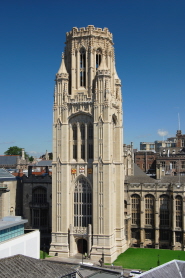Lots of universities and colleges owe their establishment to the generosity and public spirit of wealthy benefactors. Some of these (especially Oxbridge colleges) date back to the Middle Ages but others are more recent, such as some of the Civic universities. Jesse Boot, founder of Boots the Chemist, was a generous donor in helping to establish University College Nottingham, now the University of Nottingham, and the Wills Family (wealth based on tobacco) gave large amounts toward the establishment of the University of Bristol. But both of these cases were around a century or more ago and it’s a bit different nowadays, at least in the UK.

In general terms I would guess that is largely down to being not something the wealthiest individuals want to spend their money on these days. Universities are, after all, very long term ventures, not terribly glamorous or headline worthy, and they tend to be full of people who aren’t terribly excited by the idea of giving regular thanks for a benefactor’s generosity.
The new generation
There is one recent notable example in the UK though where the multi-millionaire vacuum cleaner magnate James Dyson invested in the creation of a new engineering-focused higher education institution (named after himself, naturally). Numbers remain small but it has progressed and Dyson has stuck with it, despite relocation of some of his company’s activities overseas. Initially having degrees validated by the University of Warwick it now has its own degree-awarding powers and university title cannot be too far off. Whilst it is still a modestly sized institute this is clearly very much one of the models for the kind of challenger institution the architects of the 2017 Higher Education and Research Act were hoping for.

European developments
Another prominent example of this type is the Central European University, a private HEI founded by George Soros in 1991. After a promising start it has faced significant challenges to its academic freedom in Hungary in recent years following legislative changes there, some of which looked like they were very much targeted at this university. To escape these restrictions on its freedoms it has now largely relocated to Vienna where things are a little more friendly. It is impressive though the way the original benefactor has continued to support the institution throughout all of these challenges.

X marks the spot
Over in the US, where there has long been a stronger tradition of wealthy (and indeed not so well off) donors supporting the establishment and continuing operation of universities, there are plenty more examples to point out. One of the more interesting of these in recent years has been the launch in Texas of the University of Austin. Austin has been set up by a group of similarly minded wealthy benefactors essentially to challenge what they see as the pervasive impact of wokeism on US higher eduction. The university is therefore “dedicated to the fearless pursuit of truth” according to its website. It has already attracted lots of interest, particularly from those on the right, and it remains to be seen the extent to which the politics of its supporters end up influencing the nature of the fearlessness of the truth pursuit.
It will certainly be interesting to see how things pan out there. Meanwhile, the billionaire’s billionaire (I think that’s how he is known), and spaceship/electric car/social media super over-achiever Elon Musk has announced his intention to enter the university benefaction game. Austin clearly is the place to do this kind of thing and the story on this appears in the Texas Tribune which says that Bloomberg News picked up the fact from tax returns relating to a Musk charity:
The charity, called The Foundation, plans to use a $100 million gift from Musk to create and launch a primary and secondary school in Austin focused on teaching science, technology, engineering and math. Once it is fully operational, the filing states, the school will focus on creating a university. The school intends to seek accreditation by the Southern Association of Colleges and Schools Commission on Colleges, a necessary first step to launch the school.
According to the filing, the university would teach students in person “as well as using distance education technologies.” It expects to start enrollment with 50 students and scale up over time. The school would fund its activities through donations and tuition fees, though the filing also states that if a student cannot pay tuition or fees, the school could provide financial aid. It is currently hiring an executive director, teachers and administrators, the filing states.
Musk’s plan to start a new university in Austin — already home to the flagship University of Texas at Austin and multiple other private universities — comes just as another new private school in the city plans to officially open to students in fall 2024.
The Tribune further notes that the new university does not as yet have a name. Given Musk’s track record in relation to this kind of thing I think we can be pretty confident it is going to be out there and edgy. I’d put money on a single letter, possibly a vowel from near the end of the alphabet.
None of the speculation about the new university appears to be terribly positive, most of it along the lines of a worry that the university might experience “a rapid unscheduled disassembly” (the phrase used when the most recent SpaceX rocket blew up) or something droll about renaming and destroying the value of Twitter or indeed some hilarity involving misdirected self-driving vehicles. Who knows. I’m sure though that Mr Musk will probably be too busy with other projects to get actively involved in curricular matters or indeed any other aspect of university operations. Time will tell.




Leave a comment